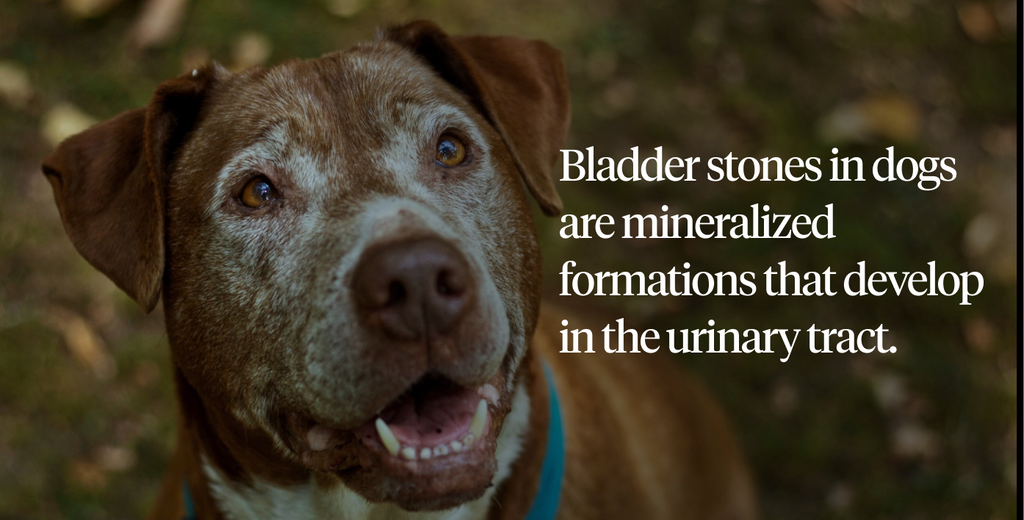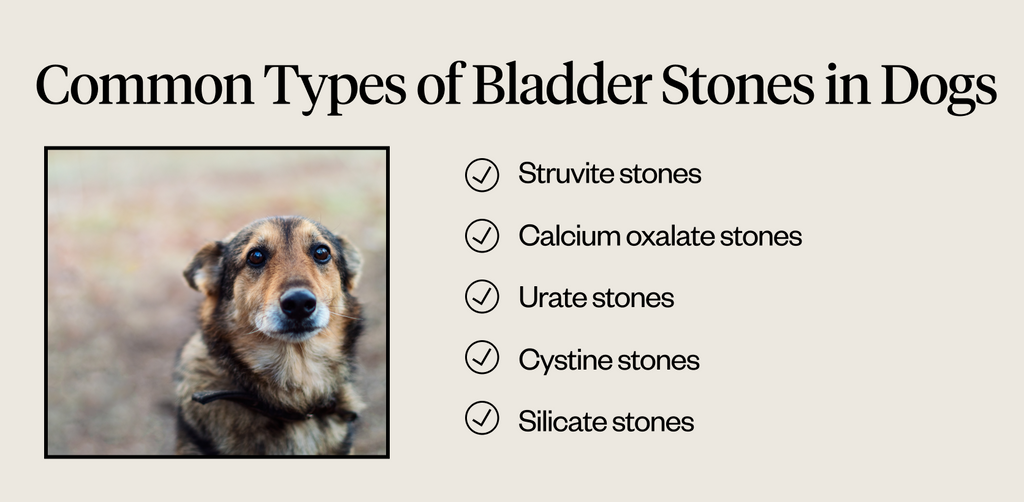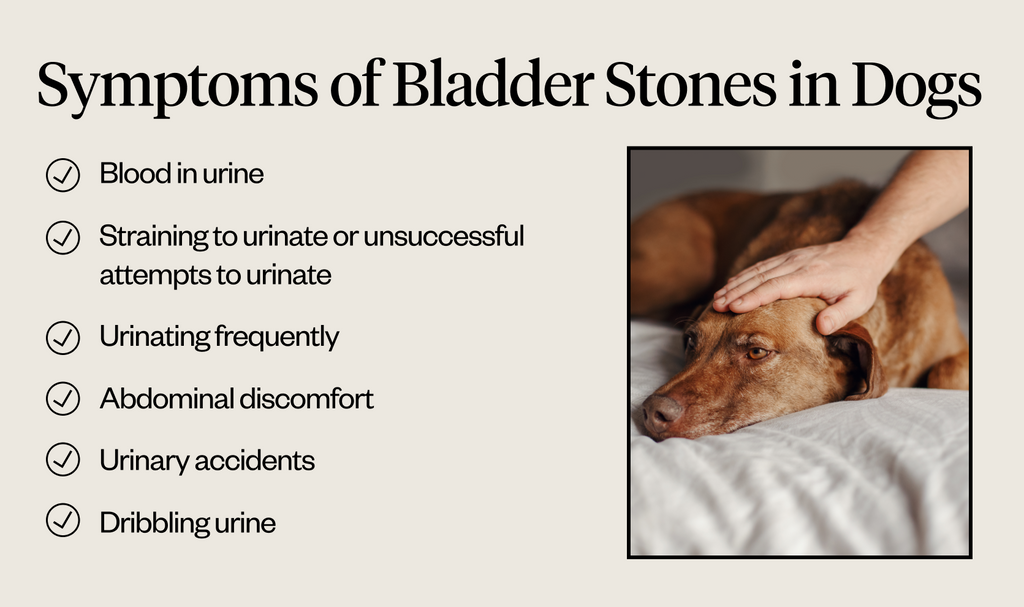10 Min Read
Bladder Stones in Dogs (Symptoms, Causes & Treatment)
Key takeaway

Why pet owners are switching to online vet care with Dutch
-
Prescriptions delivered free to you
-
Fast access to Licensed Vets over video
-
Unlimited video visits and follow-ups
Bladder stones in dogs pose a significant health concern, impacting the urinary tract and potentially leading to severe consequences. These mineralized formations can cause discomfort, urinary issues, and complications.
To safeguard your pet's well-being, it's essential to recognize the symptoms, understand the causes, and explore effective treatments. Keep reading to learn more about bladder stones in dogs.
- What are Bladder Stones?
- Symptoms of Bladder Stones in Dogs
- What Causes Bladder Stones in Dogs?
- Diagnosis, Treatment & Prevention
- FAQs
- Final Notes

What are Bladder Stones?
Bladder stones in dogs, referred to as urinary calculi or uroliths, are mineralized formations that develop in the urinary tract.1 These stones can vary in size, with some being small and passable and others growing to a size that obstructs the normal urine flow.
Bladder stones are typically composed of minerals and salts that crystalize and clump together, forming solid masses.1 These stones can develop in various parts of the urinary system, including the bladder, kidneys, urethra, or ureters. As the stones accumulate, they can cause discomfort and irritation, potentially leading to more severe complications such as urinary tract infections ( UTIs ), blockages, and damage to the urinary organs.1
Recognizing the signs and understanding the factors contributing to the formation of bladder stones in dogs is crucial for quick diagnosis and appropriate treatment to ensure your pet's health and well-being.
Urinary Stones vs. Bladder Stones
Urinary and bladder stones are often used interchangeably but refer to different locations within the urinary system. Urinary stones is a broad term encompassing any stones that can form in various parts of the urinary tract, including the kidneys, bladder, etc.1
On the other hand, bladder stones specifically refer to stones that develop within the bladder.1 All bladder stones are urinary stones, but not all urinary stones are bladder stones. The location of the stone formation within the urinary system determines the specific terminology used. The symptoms, causes, and treatments may vary depending on the location of the stones.
There are several types of urinary and bladder stones in dogs, named for the specific minerals and compounds that contribute to their formation. The most common types of bladder stones in dogs include:
- Struvite stones: These stones are composed of magnesium, ammonium, and phosphate. They typically develop in dogs with UTIs and are more common in small breeds.
- Calcium oxalate stones: These stones, formed primarily from calcium oxalate, can develop in dogs with a predisposition to high levels of calcium or oxalate in their urine.
- Urate stones: Made of uric acid, these stones are more prevalent in certain breeds, such as Dalmations.
- Cystine stones: Cystine stones, made of the amino acid cysteine, can form in dogs with a genetic predisposition, most commonly male Dachshunds.
- Silicate stones: Silicate stones form from silicate minerals associated with certain diet and nutrition factors.1
Each type of bladder stone in dogs may require a specific treatment approach. Understanding the composition of the stones aids veterinarians in tailoring an effective treatment plan that addresses the dog's specific needs.

Symptoms of Bladder Stones in Dogs
The symptoms of bladder stones in dogs can manifest in various ways, indicating discomfort and potential urinary issues. Pet owners should be vigilant and take their dog to the vet if they notice any of the following bladder stones in dogs symptoms:
- Blood in urine: One of the most common signs of bladder stones in dogs is the presence of blood in the urine, a condition known as hematuria. This can be visible as pink, red, or brown discoloration.
- Straining to urinate or unsuccessful attempts to urinate: Dogs with bladder stones often experience difficulty and discomfort during urination. Straining, along with vocalization or signs of pain, may occur.
- Urinating frequently: Dogs may exhibit an increased frequency of urination as the presence of stones irritates the bladder, prompting more frequent attempts to empty the urinary tract.
- Abdominal discomfort: Discomfort or pain in the abdominal region may occur. Dogs might become restless or reluctant to be touched around the abdomen. They may also display changes in posture.
- Urinary accidents: In some cases, dogs may exhibit inappropriate urination and urinary incontinence indoors, even if they're house-trained. This can be the result of the urgency and pain associated with bladder stones.
- Dribbling urine: Bladder stones can obstruct the normal flow of urine, leading to dribbling or difficulty fully emptying the bladder.1
Early detection and intervention can prevent complications and improve the overall prognosis for dogs with bladder stones. If you notice any of these symptoms in your dog, consult a vet for a thorough examination and testing for an accurate diagnosis and the appropriate treatment.
What Causes Bladder Stones in Dogs?
Various factors influence the formation of bladder stones in dogs, and the specific cause can vary depending on the type of stones. Some common causes and contributing factors include:
- Diet: A dog's diet can significantly impact the formation of bladder stones. Diets high in certain minerals, such as calcium, phosphorus, and magnesium, or those that create a high concentration of salt, alkaline, or acidic urine conditions, may contribute to stone formation.1
- UTIs and bladder infections: Infections in the urinary tract can create conditions favorable for the development of struvite stones. Bacterial infections may increase the pH of urine, promoting the formation of minerals.2
- Genetics: Certain dog breeds may be genetically predisposed to develop specific types of bladder stones.2 For example, dalmatians are prone to urate stones.
- Metabolic disorders: Dogs with metabolic conditions that affect the processing of minerals may be more prone to certain types of stones.2
Diagnosis, Treatment & Prevention
To diagnose bladder stones in dogs, vets typically begin with a physical examination and pay attention to signs of discomfort, abdominal pain, or any abnormalities. They'll use urinalysis to analyze the dog's urine to learn about the presence of crystals, blood, or other substances that may suggest bladder stones.2
Additionally, your vet may use X-rays or ultrasound to visualize the stones within the bladder. These diagnostic tools help determine the stones' size, location, and quantity.1
In some cases, retrieved stones can be analyzed to identify their composition, allowing the vet to provide a more tailored treatment plan.2
Treatment of bladder stones typically depends on the type of stone found, location, and size. In many cases, vets will opt to physically remove the stones. Immediate surgical intervention is crucial, especially in cases of obstruction.2
Some types of bladder stones in dogs dissolve and may not require surgical intervention. Your vet may use prescribed diets, drugs, and UTI antibiotics to dissolve stones. Unfortunately, not all stones can be dissolved, and not all dissolvable stones dissolve safely.2
Ultimately, the best treatment for bladder stones in dogs depends on the type, location, and size of the stones. Your vet will review all the options with you based on your dog's unique needs.
Keep in mind that many dogs are predisposed to bladder stones, so complete prevention isn't possible. However, there are some things you can do at home to support your dog's health and prevent urinary issues, such as providing fresh water, offering frequent urination breaks, and administering prescribed medications and specialized urinary health diets consistently.
FAQs
How long can a dog live with bladder stones?
The lifespan of a dog with bladder stones varies based on factors like the size, type, and number of stones, the dog's overall health, and the chosen treatment. In some cases, dogs can live a normal lifespan if the stones are effectively managed or surgically removed, and preventive measures are taken to avoid recurrence.
However, if left untreated, bladder stones can lead to complications such as urinary tract infections, blockages, or damage to the bladder and kidneys, which can significantly impact a dog's quality of life and longevity.
Timely diagnosis, appropriate treatment, and preventive care are crucial for ensuring a positive outcome for dogs with bladder stones.
What food causes bladder stones in dogs?
Certain types of dog food may contribute to the formation of bladder stones, especially if they have high levels of minerals that can crystallize in the urinary tract. 1 Diets rich in calcium, phosphorus, and magnesium may increase the risk of stone formation.
Breeds predisposed to certain types of stones may be more sensitive to dietary factors, so pet parents must be aware of their dog's specific dietary needs and consult with a veterinarian to choose appropriate high-quality dog food.
Providing fresh water regularly is also essential to encourage proper hydration, which can dilute urine and reduce the likelihood of crystal and stone formation.
What happens if bladder stones are left untreated?
If bladder stones in dogs are left untreated, they can lead to various complications and pose serious health risks. Larger stones or a collection of smaller stones can obstruct the urinary tract, hindering or completely blocking the flow of urine. Urinary obstruction is a medical emergency that can result in severe pain and kidney damage and may be life-threatening.1
Additionally, untreated bladder stones can contribute to kidney damage over time. Obstructions and chronic infections may impair kidney function, leading to irreversible damage.
Dogs with bladder stones also often experience pain and discomfort, which can significantly impact their quality of life and lead to behavioral changes.
If you believe your dog has bladder stones, you should seek veterinary attention. Early diagnosis and appropriate treatment can help prevent complications and improve your dog's prognosis. Regular veterinary checkups are also important to monitor your dog's urinary health and address any concerns.

Final Notes
Understanding bladder stones in dogs is crucial for pet parents to proactively protect their pet's health. Early detection and intervention are crucial for mitigating complications associated with bladder stones, ensuring a positive outcome for pets.
Talk to a vet today to learn more about dog urinary health. Our telemedicine services offer a modern platform for pet parents, allowing them to connect with experienced veterinarians from the comfort of their homes. Through virtual consultations, you can receive timely advice, discuss symptoms, and gain insights into preventive measures for bladder stones. Prioritize your dog's well-being with Dutch.
Share
References
-
"Urinary Stones." American College of Veterinary Surgeons, 11 Aug. 2023, www.acvs.org/small-animal/urinary-stones/.
-
Young, Sean. "Canine Bladder Stones." American Kennel Club, 31 July 2023, www.akc.org/breeder-programs/akc-breeder-of-merit-program/inner-circle-newsletter/canine-bladder-stones-marthina-greer/.
